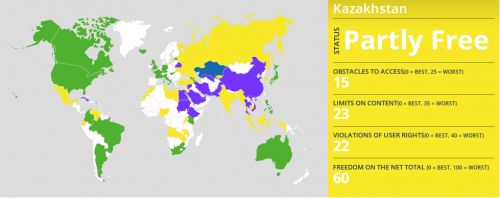AKIPRESS.COM - Kazakhstan's freedom on the Internet came close to the edge of "partly free" with "unfree", according to the Freedom House's rating of Freedom on the Net 2014.
This year, Kazakhstan's Internet freedom is ranked 60th (59 - in 2013) among 65 countries.
Freedom on the Net 2014 – the fifth annual comprehensive study of internet freedom around the globe, covering developments in 65 countries that occurred between May 2013 and May 2014 –finds internet freedom around the world in decline for the fourth consecutive year, with 36 out of 65 countries assessed in the report experiencing a negative trajectory during the coverage period.
Dozens of citizen journalists were attacked while reporting on conflict in Syria and antigovernment protests in Egypt, Turkey and Ukraine. Other governments stepped up licensing and regulation for web platforms.
Kazakhstan's Internet freedom
The government of Kazakhstan has passed multiple laws or decrees over the past year that, if applied, would significantly inhibit media and internet freedoms. On April 12, 2014, a restrictive “state of emergency” decree went into effect that would allow authorities to suspend or censor media outlets during a declared state of emergency, including political or social crises such as mass riots.
The ministry of transport and communications, together with Kazakhtelecom, the main telephone and internet access provider, continue efforts to upgrade the country’s ICT infrastructure and to improve and promote e-government services. State entities have been instructed to enhance their websites to incorporate better feedback functionality and to set up official accounts on social networks.
In the past few years, critical media outlets have been blocked, including the website of the banned Respublika newspaper and NurAdam.kz, the website of the Adam opposition magazine. Additionally, sites such as Ratel.kz, the online project launched in 2013 by a group of prominent journalists, have suffered from DDoS attacks, even though hard copies of their small circulations could easily be found in the newsstands of Almaty. Most cases of prosecution of individuals involving the internet have been rooted in the individuals’ offline activism, rather than caused by their online activity.
The authorities clearly fear the internet’s democratizing potential, which has led the government to pass legislation to acquire broader control over the internet, often disguised as national security or anti-terrorism amendments, in addition to the legally endorsed practice of blocking certain websites. In May 2013, President Nursultan Nazarbayev signed the law “On personal information and its protection,” which was criticized by media activists as restrictive for journalism.

